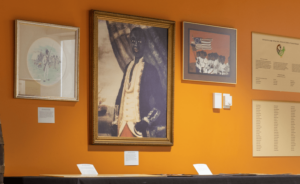by The Cowl Editor on February 27, 2020
Campus
by Will Devaney ’23
News Staff
Every February, the country commemorates the struggles and achievements of African Americans in their pursuit of equality and justice in the United States. Most students know at least some aspects of black history, but few know of the historical impact that African Americans have had right here in Rhode Island.
The Black History Exhibition in The Center at Moore Hall gave the Providence College community an opportunity to explore the rich African American heritage right in our own backyard.
The exhibit chronicled black history in Rhode Island from African culture before the slave trade to 20th century political struggles to gain equality. Some of the artifacts included tribal masks and figures from West African countries, 19th century African American literature, and a large collection of historical photographs of African American families in Rhode Island.
Displays from the Rhode Island State Archives were also feautred that explained the African American influence in various periods of American history. In the years after the American Revolution, Rhode Island controlled roughly 60 percent to 90 percent of all the slave trade in the U.S.
The artifacts in the exhibit focused on black history in Rhode Island, specifically. There were political pamphlets that called for reform from the Gilded Age, a barrel from an 18th century rum distillery in Newport, and even images of the 1652 Rhode Island decree that abolished slavery, a law that would become largely unenforced in later centuries.
The exhibit serves to educate PC students and faculty during a month where we look back at the rich history and culture of the African American community. The location of the exhibit was chosen so that “it would be convenient for everyone, especially students coming right out of class,” said Nick Sailor ‘17, the director of Education and Training for Diversity, Equity, and Inclusion. He added, “The exhibit offers the opportunity to learn more about black history, particularly as it relates to our own local history.”
With racial inequality and injustice still prevalent in contemporary society, the celebration of Black History Month has never been more important. As much as the exhibit is about the past, it is ultimately tied to the present. “All of these pieces provide specific details for the conversations happening today about black history,” said Sailor.
The Black History Exhibition is an effective and unique way to showcase an important side of local history that is often overlooked. To wrap up Black History Month, the Board of Programmers (BOP) will be hosting an event titled “Black Expo: We Are One” to celebrate African American achievements, Pan-Africanism, and the unity of the African Diaspora. It will be held in Moore 125 Lounge on Thursday, February 27.
